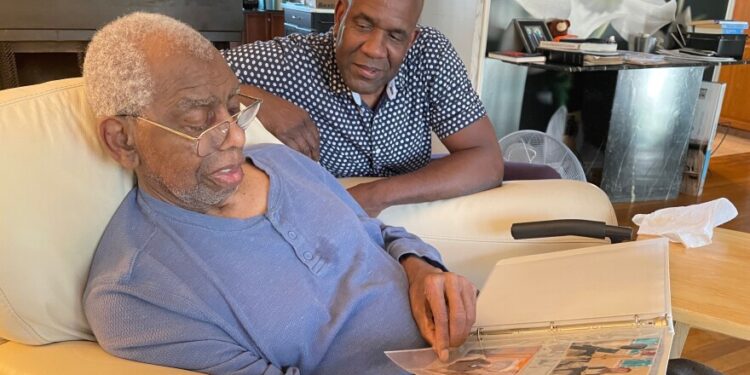Robert Turner spends time with his father, Robert Turner Sr. As a professor and researcher, the younger Turner is examining the experiences of the significant number of African American men who serve as caregivers. Img source: www.klcc.org
May 21, 2024 Story by: Editor
Robert Turner didn’t foresee the last 24 hours unfolding as they did. His 85-year-old father was unexpectedly hospitalized overnight. Turner just brought him home to Piscataway, New Jersey, carefully helping him out of the car and, with the assistance of their home health aide, guiding him up the stairs and into a comfortable chair in the living room.
“It’s good to be back from the hospital, right?” Turner asks his father as they enjoy some ice cream together. His dad nods in agreement.
Turner is part of a growing yet often unrecognized group: Black male caregivers. Nearly 40% of those caring for older adults are men, and about a third of these men are Black. However, Black male caregivers face unique challenges. African American men generally have the poorest health outcomes in the U.S., are less likely to be married, and often care for loved ones alone. They also confront negative societal perceptions.
“Black men in America, given our profile and treatment, many men feel as though life is stressful on so many different levels,” Turner says.
Combining Personal and Professional Passions
Several years ago, Turner merged his personal experience with his professional interests by researching Black male caregivers. As an associate professor at George Washington University’s School of Medicine and Health Sciences, specializing in sociology and neurology, he has been studying the brain health of Black men caring for someone with dementia.
Turner’s father, also named Robert, has Alzheimer’s. He was withdrawn during his hospital stay but brightened up once home, smiling and chatting despite the challenge of eating mango ice cream with a cast on his arm.
The elder Turner joined the Marines at 19, became an electrician, raised four children, and served as a church deacon. Since Turner’s mother passed away two years ago, he has been his father’s primary caregiver. The bond between them has only strengthened.
“It’s been an amazing experience for me,” Turner shares. “It has given me this incredible time to reflect back on our relationship and…how many of the traits that I have are because I’ve learned from him, and looked up to my dad as my hero in life.”
Turner notes that most caregiver stress research focuses on women, motivating him to highlight the experiences of Black male caregivers. He aims to address the financial burden and health disparities they face. Turner will publish his study’s results later this year.
“We’re trying to understand the stress related to caregiving in Black men, both physiological stress and neurocognitive functions,” he says. Many Black men were eager to participate in his study, feeling seen for the first time in this research context. Source: npr
Navigating Family Dynamics and Support
Family relationships can complicate caregiving. Diane Mariani, who oversees the Caring for Caregivers program at Rush University Medical Center, observes that even within large families, support often falls short.
“That lack of help can add to feelings of isolation and overload in a role many men choose not to discuss publicly,” she says. Yet, African American caregivers in her program report lower emotional strain and greater meaning in their roles compared to white caregivers. This support results in better outcomes for both caregivers and those they care for, including fewer and shorter hospital stays.
Don Williams, who commutes from Maryland to care for his 97-year-old mother in Georgia, is part of a faith-based caregivers support group for African Americans. His faith has been a crucial support system.
“My faith has gotten me through so many different things over my life,” Williams says. “I know that it helps sustain me and helps me make decisions that I need to because I couldn’t do this by myself.”
Williams, a widower diagnosed with metastatic prostate cancer in 2020, balanced caregiving with his cancer treatment, now completed. Despite the strain, he remains committed to his mother, feeling it is a loving duty.
“If my mother leaves this world before me, I’ll know I will have done everything I could to contribute to her quality of life,” he says.
Turner shares this sentiment. His father has good and bad days, but even after a challenging day, he remains upbeat. As his father’s condition progresses, he has transitioned from whistling to singing, bringing joy to their time together.
“He has shown me every step of the way how to be a man,” Turner says. “Even now in his state, he is showing me what dignity and what grace is, and what honor and respect are, and how to age gracefully.”
Turner continues to look up to his father, dedicated to being there for him as long as needed.
















